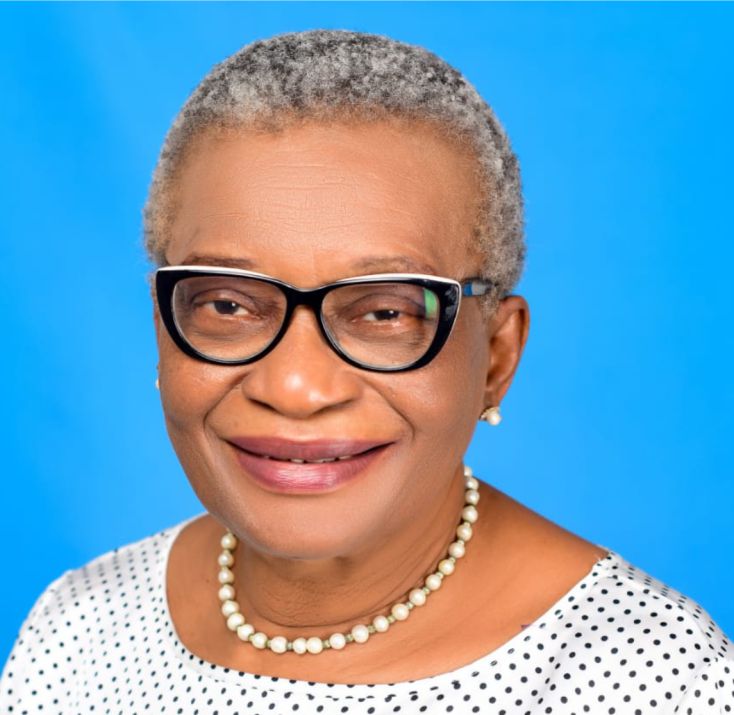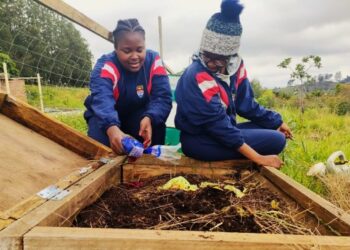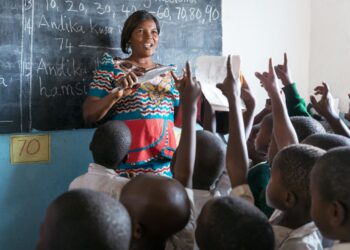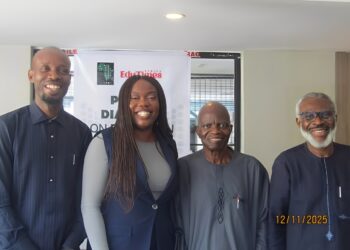Ma, what was it like growing up?
A bit about my time growing up.
I was born in Ibadan Oyo State and my early years were spent in Ilesha and Ibadan where my parents worked in the public service. After my primary school education in Ilesha and Ibadan, I attended St Annes School, Molete, Ibadan and later attended Queens School Enugu for Higher School. I then proceeded to University of Nigeria, Nsukka to study Zoology but the civil war disrupted my stay in Nsukka. After we were ‘liberated’, I ended up as one of the South Eastern State refugees in the then University of Ife. I studied Zoology and graduated in 1971. I enrolled in Cornell University, Ithaca for a Master’s Degree in parasitology. After three years teaching in the University of Nigeria Nsukka, I returned to Cornell in 1976 for a PhD in parasitology.
Why the choice of academia as a career? Is that what you wanted to do?
Yes, that is what I wanted to do. My parents were educated. My Father was a civil servant and my mother was a teacher in a Teachers Training College. I and my siblings had the opportunity to interact with teachers/lecturers. My interest in academia further intensified when I was undergoing my secondary school education in St Annes School, Ibadan and higher school, Enugu. The quality of education we received pointed me towards the academia. After the civil war I got married to a lecturer in University of Ibadan. That settled it!
How does the quality of education during your time as a student and as a young lecturer compare to the quality of education now?
We hear stories of foreigners attending Nigerian universities back in those days. I don’t know how true that is.
The quality of education during my time was high. Teaching and learning facilities were easily available. There were fewer students so carrying capacity was adequate and student teacher ratio was optimal. We had foreigners in our schools then mainly as teachers/lecturers. We also had foreign student then mainly from African countries.
I know that there is not much learning going on in most public primary and secondary schools in our nation now, particularly in the rural areas. The gaps are glaring. Poor funding resulting in poor educational infrastructure, inadequate classrooms, inadequate teaching aids and inadequate number of qualified teachers. The learning environment is so inadequate that urgent intervention is required to strengthen education foundation at this level otherwise the tertiary institutions will continue to receive faulty products. Let me speak for science here. Many gifted youths are unable to make a career in science because they lack basic foundation in science. The reasons for this are obvious. Most public schools do not have ideal teaching and learning facilities. Science laboratories, workshops and functional libraries are either absent or ill equipped in these public schools. There are also not enough adequately trained teachers to stimulate the interest of the pupils and students in science. Private schools may be better off and some public schools in a few states may be receiving government attention but the gaps are glaring in public schools particularly in the rural areas. Expectedly, many students who gain admission into STEM programmes in tertiary Institutions lack basic science foundation for successful careers in science. This has far- reaching negative effect on learning and eventually on quality of research output. If you wish to have practical experience of the situation I am describing, please find time, someday, to visit the primary and secondary schools you attended.
In your candid opinion, what do you think can be done to restore the educational sector in Nigeria?
Declare an emergency in the education sector in Nigeria! Focus on public primary and secondary schools.
Audit existing policies, merging some, if necessary, and prioritize implementation of aspects that are key to the achievement of Education For All.
Intensify advocacy to leaders at all levels for a change in mindset so they regard resources allocated to the education sector as an investment and not expenditure. Attention should be given to improving access to education. Not all who should be educated have access to education. The poor, the differently abled, the girl child and other marginalized groups are missing in the classrooms.
Provide adequate facilities and services required for learning and teaching in schools. This will improve quality of education because education must be of the right quality to be useful to the individual, community and nation. Quality of curriculum, facilities and teachers need to be improved upon. The content of curriculum should be revised and made appropriate for the desired outcome. A close look at the grassroots reveals a deficit of basic physical facilities as well as services in many schools particularly in remote areas. In such schools, the environment is not conducive for learning.
Quality of teachers needs to be addressed otherwise teaching becomes a process of recycling ignorance in some instances. In Nigeria, there is often no strict regulation on who teaches/ who is certified to teach. Fresh graduates, who have not been taught how to teach, handle teaching in schools particularly in primary and secondary schools. They teach subjects but are not concerned about values, attitude and skills (life and entrepreneurial) required to meet present day challenges. On the flip side, it is important to note that work environment influences the attitude and performance of teachers. Work load, welfare and capacity building/professional development matter significantly.
Promote interdisciplinary and intersectoral collaboration and coordination in addressing reforms in the education sector. Such collaboration will reduce cost of implementation and improve quality of monitoring.
Nigeria reportedly has about 20 million school age children currently not in school. Aside from the Boko Haram and Kidnapping menace affecting education in Northern Nigeria, is there any other reason why you think this figure is so high?
Poverty! Many parents in the rural areas are not able to send their children to school because of poverty. They will rather make the children assist them in earning daily income so they can feed their families. If basic facilities and services are provided in communities, poverty will be reduced. This is where governance comes in. Government at all levels have a role to play in achievement of the Sustainable Development Goals (SDGs). Local Governments are closest to rural communities and if they play their part as expected, poverty will be reduced and families will be able to afford to send their children to school. This will reduce the number of uneducated and idle youths available for recruitment for criminal activities.
One looks at just how fast the world is changing. We see the advent of professions that hardly existed 10 years ago and the descending relevance of some other professions. Do you think the Nigerian or indeed the African school curriculum remains relevant?
Most families, in the past and some in the present, would love their children to study and become doctors, lawyers, accountants and engineers because these were/are considered to be the top professions.
The world is changing and the following are now predicted to be the top professions of the future
Software developers, Big Data analyst, Social media analyst, Web developer, Content creators, Artificial Intelligent jobs, Data protection jobs, Digital marketing professional,
Information security, Online teacher,
Community manager, Environmental engineer, Waste manager, 3D Architect and engineer, Image consultant, Innovation manager, Gene expert /editors, Talent manager, Inside sales representative, Mental health professional, Specialist in renewable or alternative energy, Financial manager, Hospital engineer, Specialists in user/ customer services, Coaching, Personal trainer
Nigerian/African schools will have to adjust to be relevant in future. Google and online learning are fast taking over from conventional teaching and learning!
You are both revered and highly celebrated for having served as Vice Chancellor at two different universities and for being the pioneer Vice-Chancellor of the Federal University of Technology, Lafia. What was the experience like?
Yes, I was invited by Mr Donald Duke, Governor of Cross River State, to head the new Cross River University of Technology (CRUTECH). I served as Vice Chancellor from 2004 to 2009. I was again invited to serve as pioneer Vice Chancellor of Federal University, Lafia (FULafia) I served as VC from 2011 to 2016.
My experience was interesting. To answer this question, kindly permit me to quote excerpts from my address as the Vice Chancellor of the Federal University Lafia during its first Convocation in January 2016.
With a smile in my mind and on behalf of Federal University Lafia community, I welcome you all to this historic event, the first Convocation of the University. We are greatly honoured to have all stakeholders and friends of the University with us today.
When Federal University Lafia was established by the Federal government in 2011, along with eight other new Universities, we were given the mandate to increase access to, and improve quality of, education in our regions.
With this mandate it was clear from the beginning that we had a big task ahead of us. We needed, and developed, a strategic plan to guide our activities as we set out on the journey. Our vision to be a renowned institution of learning, research and innovation for positive socio-economic transformation of the nation, fueled our determination to maintain high standards in all our operations guided by minimum standards set by the National Universities Commission (NUC). This determination was based on our philosophy that education has to be of the right quality and scope to impact positively on development. It was therefore apt for us to select integrity, innovation, excellence as our core values. Since then we have been on a mission of training of graduates and equipping them with skills for socio-economic development.
The beginning for us was starting from scratch and we cannot forget this. How can we forget that at one point the registrar and I were the only staff of the University. The registrar’s personal vehicle served as official vehicle and store for our documents. We remember, and remain grateful for, the take- off- grant given us by TETFund through the kind advocacy of NUC and Federal Ministry of Education who competently midwifed the nine new Universities.
We remember the assistance we received in NUC as we utilized improvised office space provided by Professor Okojie, Executive Secretary NUC, Professor Mafiana and other staff of NUC. I am sure my colleagues the new nine still remember the numerous preparatory meetings, briefings and trainings in Abuja. Sometimes we received notice of a new meeting on our way back from the last meeting halfway into our journey back home and had to turn and head to Abuja. We remember the enquiries, clarifications, courtesy visits, advocacy visits, consultations, peer meetings and planning meetings.
We remember the numerous meetings of Committee of Vice Chancellors and Association of Vice Chancellors of Nigerian Universities, where often times, some of the issues discussed did not apply to us the new nine because we were too new! We cannot forget the valuable assistance we received from some of our colleagues in older Universities who spent days with us in Abuja to put together our academic brief and other documents required for take- off.
I remember the Registrar and I being brought to Lafia by the Hon Minister of Education and Executive Secretary NUC for introduction to Governor Akwe Doma and his Cabinet. Later, another visit was made to hand us over to Governor Al Makura. We cannot forget the warm reception we received from Nasarawa State Government on both occasions.
Distinguished ladies and gentlemen, if I forget everything else, I will always remember that the big tree (at the corner of the car park), now labelled Ficus benjamina by Botany department once served as office for the Registrar and I. The Dean of Science, a Professor of Botany has informed me that the common name of this tree is weeping fig tree. The Registrar and I shared one plastic table in this under- the- tree office but we had no cause to weep because we received unprecedented cooperation from our Mararaba Akunza host communities. Youths from the communities were mobilized to clear and clean this site. We were surprised and elated when, one day during this period, we saw Governor Tanko Almakura drive himself into this site to check on the progress of work. We received him from our office under the tree. The Emir of Lafia also visited us on site during this period.
Distinguished ladies and gentlemen this journey has been tasking but interesting and fulfilling. There were challenges but we saw in the challenges opportunities for valuable learning. The difficult times strengthened our strategic thinking skills and became opportunities for us to continuously raise our bar. The difficult times also taught us innovative prudence in resource management which we have locally named financial engineering. What helped us was that we consistently kept our eyes on our mandate and core values.
The extraordinary dedication of staff of the University, who have worked tirelessly, many times beyond the call of duty, have made it possible for us to successfully carry out top class teaching, research and community service. The quality of our teaching will be reflected in the quality of graduates we produce beginning from the set graduating today. The number of prizes we have won in competitions organized by NUC, Federal Government and other agencies reflect our commitment to providing evidence based solutions to socio economic problems in our immediate environment and in our nation. The impact of our community service initiatives is already evident in our host communities.
I hope that adequately answers your question.
Yes it does. Ma, this is a question that I just have to ask. With Nigeria being a patriarchal society, how were you able to surmount gender and geopolitics to become the first female President of the Nigerian Academy of Science?
The Nigerian Academy of Science does not do politics! The Nigerian Academy of Science is the foremost independent science body in Nigeria. The Academy was founded in 1977 as a national non-political, not-for-profit organization with membership covering all fields of science including medicine and engineering. The Nigerian Academy of Science is the national representative on the International Science Council (ISC), the Inter-Academy Partnership (IAP), and the Network of African Science Academies (NASAC). Since inception, the Academy has continued to implement its mandate to develop and advance science, technology and innovation and bring scientific knowledge to bear on policies and strategic direction of Nigeria.
The election of Fellows starts with a nomination by a Fellow in the same discipline supported by three other Fellows. This is followed by a rigorous peer-assessment and ends in very competitive process resulting in election of no more than 10 scientists into the NAS Fellowship annually. There is no gender and geopolitical considerations in election of Fellows in The Nigerian Academy of Science. My emergence as President elect and later President of the Academy was smooth with no need for campaign and lobbying. The Academy has a procedure that makes this possible.
______________________________ Professor Ekanem Ikpi Braide, OFR, FAS FPPSN is an indigene of Cross River State, Nigeria and was born on March 6, 1946. She holds a Bachelors degree in Zoology (Ife, Nigeria 1971) as well as Masters and Doctorate degrees in Parasitology/Epidemiology (1973, 1978, Cornell, USA). She also holds a Certificate in Epidemiological Methods from Southampton University (British Council Course 1986). She taught in Community Secondary School, Ugep (1966 – 1968), College of Education, Port Harcourt (1973) and University of Nigeria, Nsukka (1973 – 1976). She served at the Nigerian Institute for Trypanosomiasis Research, Kaduna (1978 - 1979) as a pioneer officer/researcher in charge of the Onchocerciasis Control Unit of the Institute. Thereafter, she joined the University of Calabar in 1979 as a lecturer and was promoted to the rank of Professor in 1991. Prof. Braide’s research focus is on disease control, particularly operational research, impact assessment of interventions, rapid assessment methods in mapping diseases and community initiatives in disease control. She served as the Zonal Facilitator in the Nigerian Guinea worm Eradication Programme, South East Zone from 1988 to 1998 and on the WHO/FGN Guinea worm Eradication Certification Committee until Nigeria was certified guinea worm free in 2013. She coordinated Anglophone teams for the African Programme on Onchocerciasis Control (APOC) multi-country impact assessment of onchocerciasis control activities in Sudan, Ethiopia, Uganda, Tanzania and Nigeria. She was a member of the WHO/TDR/APOC team that developed RAPLOA, a rapid assessment tool for determining prevalence of Loa loa for quick identification of communities in areas co-endemic for onchocerciasis and loaisis that are at high risk of severe adverse reactions to ivermectin (Mectizan) treatment. Professor Braide was a member of WHO/APOC Technical Consultative Committee (TCC) from 2001 to 2006 and chaired the Committee from 2003 to 2006. She was also a member of Mectizan Expert Committee from 2003 to 2006. She served as member (Alternate Chairman) of National Steering Committee, Nigerian Neglected Tropical Diseases Programme (2007-2018) and as Chairman, Technical Advisory Committee, Cross River State Neglected Tropical Diseases Programme (2015-2018). She also served as a member of the Board of Trustees of Sightsavers for eight years and chaired the Technical Advisory Group (TAG) of the four- year Sightsavers DFID funded NTD UNITED project which ended in 2019. She is President of the Board of Trustees, Society for Family Health (SFH) and Chairman of the Board of Trustees, The Leprosy Mission (TLM) Nigeria. She is; member The Ministerial Expert Advisory Committee on COVID- 19 Health Sector Response (MEACoC-HSR); member African Scientific Research and Innovation Committee (ASRIC) Expert Advisory Board on STI intervention for COVID-19 (2020) and member, TETFund Committee on Research and Development (2020-ongoing). Professor Braide is co- founder and Fellow, Nigerian Society for Parasitology (now Parasitology and Public Health Society of Nigeria); Fellow, Salzburg Seminar Session 319; co-founder and Chairman, Youth Care; co-founder and Coordinator, Coalition of Youth Serving NGOs and President, Nigerian Academy of Science. She is a National Patron of Boys Brigade, Nigeria and has received many awards from various churches for her support of evangelism and assistance to the needy. She has received many awards, including, Cross River State 2000 Millennium Award and Jimmy/Roslynn Carter Award for outstanding dedication and achievement in the eradication of guinea worm in Nigeria. In July 2010, Professor Braide was honoured by the President of Nigeria with the award of Officer of the Order of the Federal Republic (OFR) for her contribution to disease control in Nigeria. Professor Braide served as Vice Chancellor, Cross River University of Technology (CRUTECH) Calabar, Nigeria (2004 to 2009) and as Pioneer Vice Chancellor, Federal University, Lafia, Nigeria (2011 to 2016). She is the Pro-Chancellor of Arthur Jarvis University, Akpabuyo, Nigeria and also Chairman, Board of Trustees, Essien Ukpabio Presbyterian Theological College, Itu (EUPTCI), Nigeria. Professor Braide and her husband, late Professor Victor Bowerson-Chase Braide, have two children, Pamela and Opubo.




















































































 EduTimes Africa, a product of Education Times Africa, is a magazine publication that aims to lend its support to close the yawning gap in Africa's educational development.
EduTimes Africa, a product of Education Times Africa, is a magazine publication that aims to lend its support to close the yawning gap in Africa's educational development.